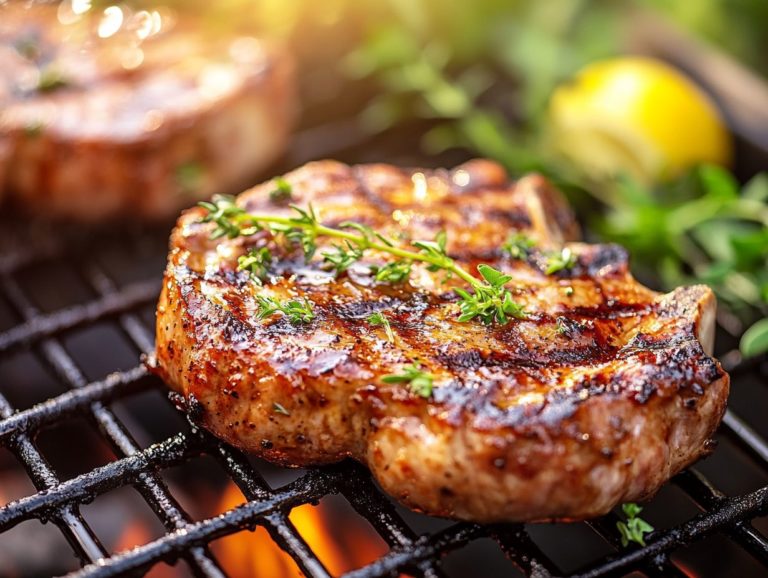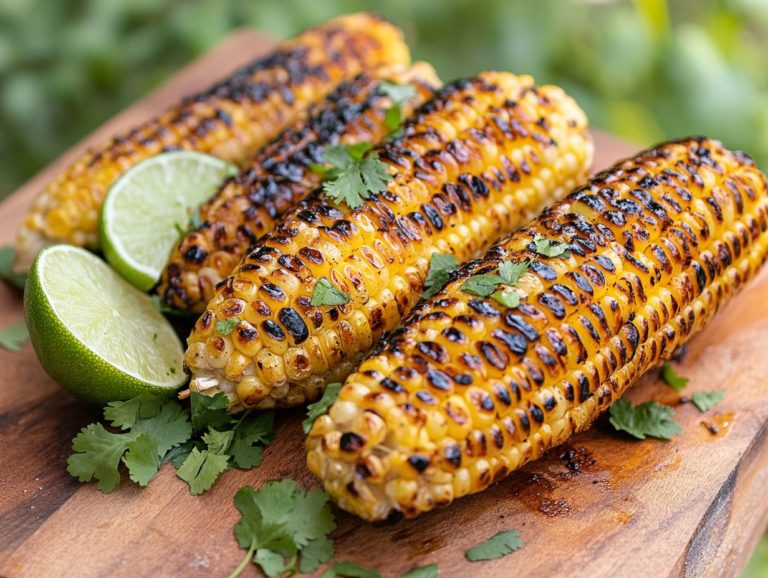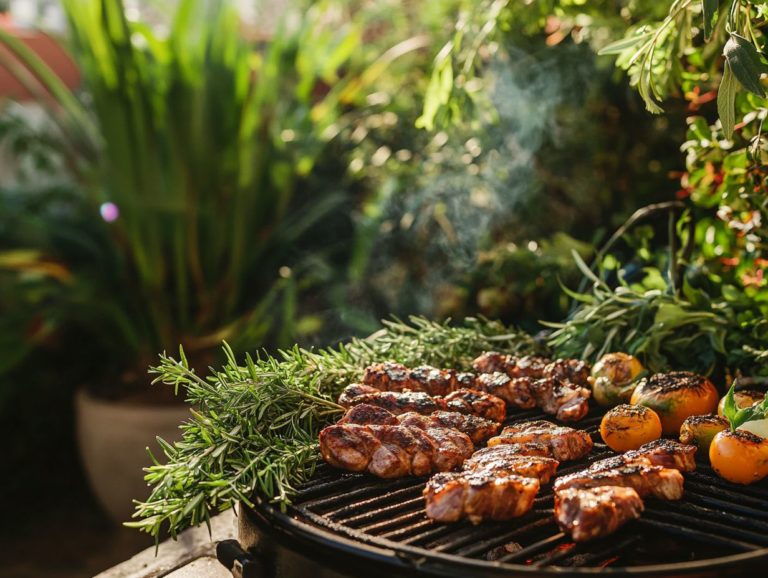The Impact of Grill Type on Cooking Time
Grilling is an exciting art! Understanding cook time nuances can help you master that perfect barbecue.
This exploration delves into the various factors that influence cooking time, beginning with the different types of grills at your disposal be it charcoal, gas, or electric. Each type has its unique cooking method and characteristics.
You’ll discover how each grill type impacts cooking times and gain valuable tips for adjusting those times based on cooking temperature, meat thickness, and other critical considerations like ambient air and humidity levels.
Regardless of whether you’re just starting out or you ve mastered the grill, this guide will take your grilling skills to the next level!
Contents
- Key Takeaways:
- Understanding Cooking Time
- Types of Grills
- How Grill Type Affects Cooking Time
- Tips for Adjusting Cooking Time
- More Cooking Time Influencers
- Frequently Asked Questions
- 1. What is the impact of grill type on cooking time?
- 2. Does the grill type affect the cooking time for all types of food, including various types of meat and vegetables?
- 3. How does a gas grill compare to a charcoal grill in terms of cooking time and proper temperature?
- 4. Can the size of the grill impact cooking time and the cooking practices used?
- 5. Do different types of grills require different cooking methods and techniques to achieve desired results?
- 6. Is there a significant difference in cooking time between electric and propane grills, particularly in relation to cooking guides?
Key Takeaways:
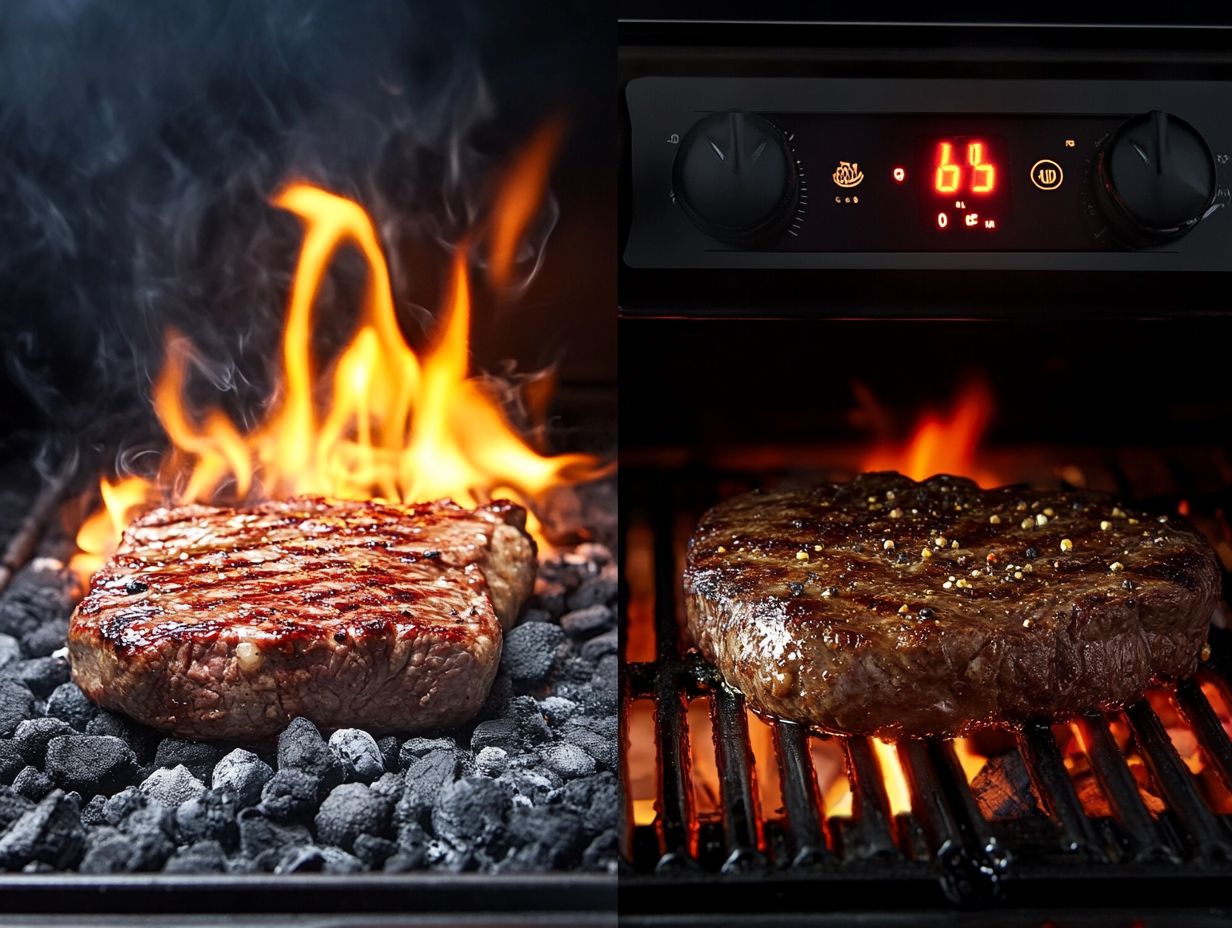
- Choosing the right grill can dramatically change your cooking times!
- Factors such as grill type, temperature, and meat thickness all play a role in determining cooking time.
- Be aware of these factors and make necessary adjustments to ensure perfectly cooked food every time.
Understanding Cooking Time
Grasping the nuances of cooking time is vital for achieving that perfect tenderness while also prioritizing food safety when grilling various meats. Cook times fluctuate considerably, influenced by several key factors: the cooking method you choose, the type of meat you’re preparing, and the precise cooking temperature that best suits each meat s unique attributes.
Elements like ambient air temperature, humidity, and even altitude also impact cooking duration, ultimately shaping the success of your cooking efforts.
Factors that Affect Cooking Time
Several factors significantly influence your cooking time, including the thickness of the meat, its fat content, and the cooking temperature you choose for grilling.
A thicker cut of meat naturally requires more time to reach that perfect doneness, as the heat takes its time to penetrate.
If you re working with meat that has a higher fat content, it can render and baste itself as it cooks, which often means a longer cooking process at lower temperatures a double-edged sword for grilling aficionados like yourself.
Understanding the phenomenon known as the meat stall which is when the cooking process slows down due to moisture loss is crucial for anyone aiming for perfection on the grill.
To tackle these challenges effectively, using a kitchen tool that measures the internal temperature of meat becomes essential. This tool ensures your food reaches a safe internal temperature, marrying culinary skill with food safety for a truly delightful outcome while also preventing the dreaded meat stall.
Types of Grills
You ll discover a variety of grills, each presenting distinct advantages and unique cooking methods that can significantly elevate your grilling experience and outcomes.
Whether you opt for traditional charcoal and gas grills or venture into specialized smokers and Kamado cookers, grasping the nuances of each grill type will enhance your outdoor culinary pursuits.
Each grill boasts unique features that influence heat distribution, smoke flavor, and overall cooking efficiency, enabling you to explore a diverse array of culinary techniques and barbecue styles.
Overview of Different Grill Types
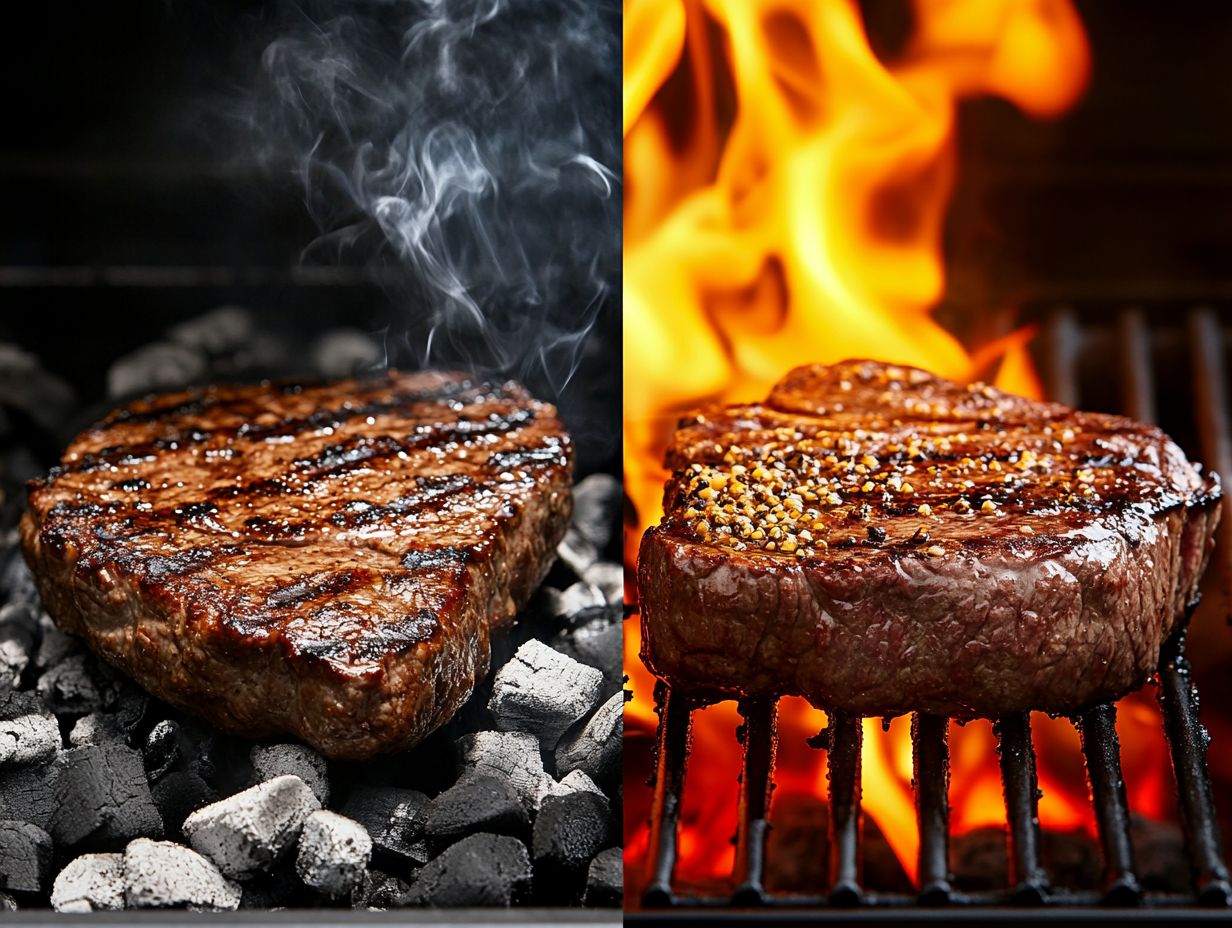
Exploring various types of grills opens up a world of options: gas grills, charcoal grills, electric grills, and specialized smokers. Each type is designed for distinct cooking styles.
For any grilling enthusiast, understanding how each type operates is essential for optimizing cooking times for various meats. Gas grills shine with convenience and rapid heat-up times, offering precise temperature control ideal for searing meats and quick weeknight dinners.
Charcoal grills bring a beloved smoky flavor that aficionados adore, enhancing the overall flavor profile of grilled dishes. They take longer to reach optimal temperatures and are perfect for leisurely weekend barbecues focused on flavor.
Electric grills provide a user-friendly choice for indoor cooking. Specialized smokers embrace the low-and-slow technique, transforming tougher cuts of meat into tender, flavorful masterpieces over several hours.
Every grill type affects cooking times and significantly influences the taste and texture of your food.
How Grill Type Affects Cooking Time
The type of grill you choose profoundly influences cooking time. Each grill operates in its unique way, impacting temperature control and heat distribution.
For example, cooking over direct heat on a gas grill typically results in faster cooking times compared to a Kamado cooker, a type of grill that uses a ceramic design to cook food slowly.
Comparison of Cooking Times for Different Grill Types
When you compare cooking times across different grill types, you’ll notice distinct variations in how each method influences the overall grilling process and meat preparation.
Using a gas grill, you’ll appreciate its quick preheating, allowing beef steaks to reach medium-rare in just 6-8 minutes per side at a high temperature. In contrast, charcoal grills may require 12-14 minutes for the same cut due to their heating process.
Pork chops show a similar trend; with a pellet grill set at a lower temperature, expect them to take around 20-25 minutes for juicy tenderness. Direct grilling can cut that down to about 10-12 minutes, depending on thickness.
Chicken offers various possibilities and cooking methods. Grilling on a ceramic grill can yield perfectly cooked pieces with crispy skin in approximately 30 minutes. Traditional methods could result in uneven results if you’re not attentive to cooking times.
This highlights the importance of understanding these dynamics mastering grilling techniques will elevate your BBQ game!
Tips for Adjusting Cooking Time
Adjusting cooking time effectively requires a keen understanding of essential tips that can elevate your grilling experience and guarantee optimal results.
Different grilling techniques demand unique approaches to managing cook time, especially regarding meat thickness, fat content, and ambient temperature.
By applying these thoughtful adjustments, you ll achieve perfectly cooked meat every time, whether you’re cranking up the heat or embracing the art of low-and-slow smoking methods.
Factors to Consider and Adjustments to Make
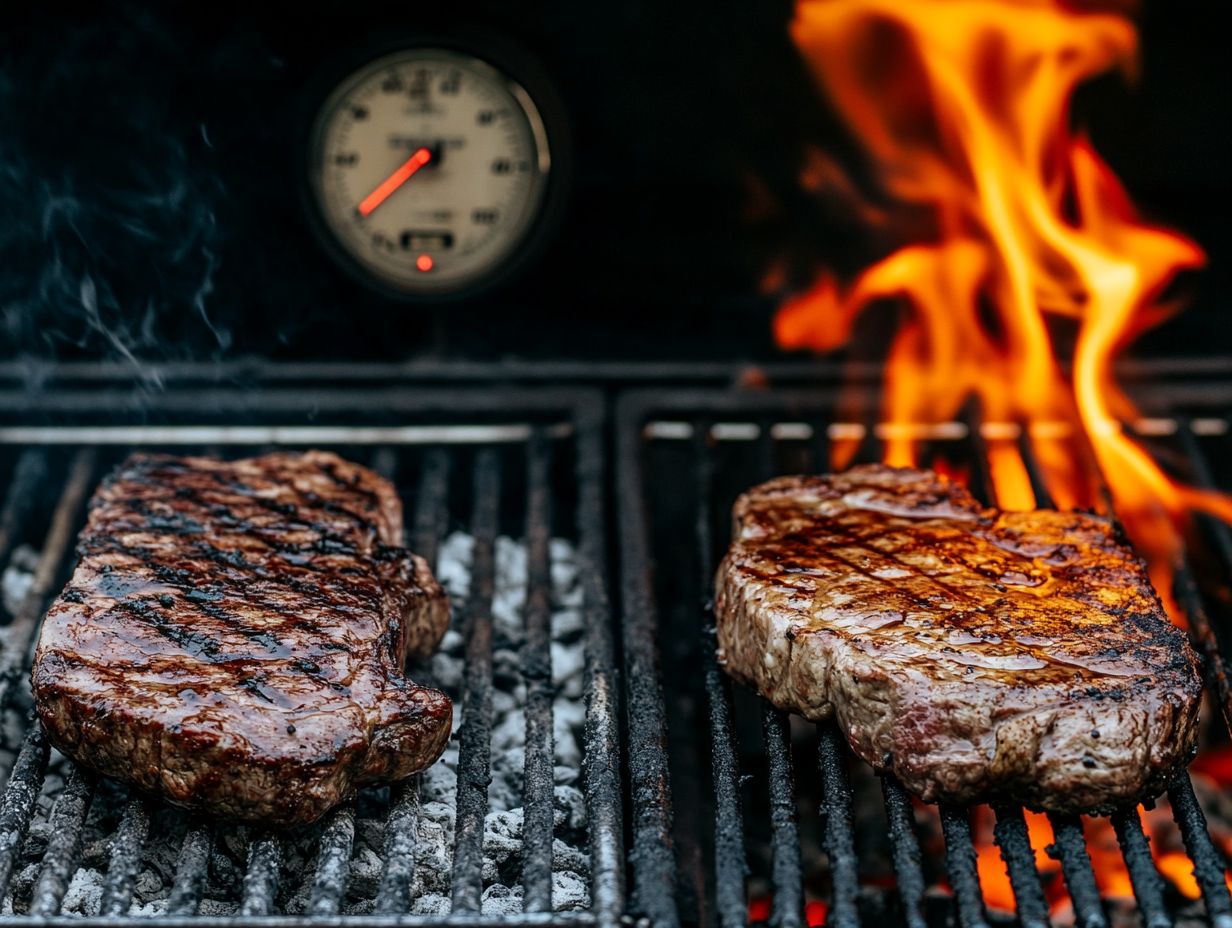
When adjusting cooking time, consider several key factors. These include the thickness of the meat, the cooking temperature, and the grilling method you use.
Thicker cuts of meat require more time to cook thoroughly. In contrast, thinner pieces can cook quickly, risking dryness if not closely monitored. The cooking temperature is also crucial. Higher temperatures can speed up cooking but may lead to uneven doneness.
The grilling method also affects the final result. Whether you re using direct heat (cooking directly over the flame) or indirect heat (cooking away from the flame), it greatly influences your meat.
To keep your food safe, use a probe thermometer to check internal temperatures. This confirms that the meat reaches the desired doneness while maintaining its juiciness. By understanding these variables, you can make informed adjustments that elevate your grilling experience.
More Cooking Time Influencers
Beyond the primary factors, consider additional variables that significantly affect cooking time. Elements like ambient temperature, humidity levels, and specific cooking methods all play crucial roles in determining how your culinary creation turns out.
Temperature, Meat Thickness, and Other Considerations
Temperature and the thickness of the meat are essential factors in determining your cooking time. They influence how evenly and thoroughly your food cooks.
When grilling, understanding the relationship between these elements is key to getting mouthwatering results. The ideal internal temperature varies by meat type, while thickness affects how well heat penetrates.
Keep an eye on the grill s ambient conditions, as external factors like wind or humidity can significantly change your cooking dynamics.
Using an instant-read thermometer along with visual cues allows you to assess doneness accurately. This ensures a perfect sear on the outside while locking in moisture. Adjusting your cooking times based on these factors will help you create consistently satisfying meals every time.
Frequently Asked Questions
1. What is the impact of grill type on cooking time?
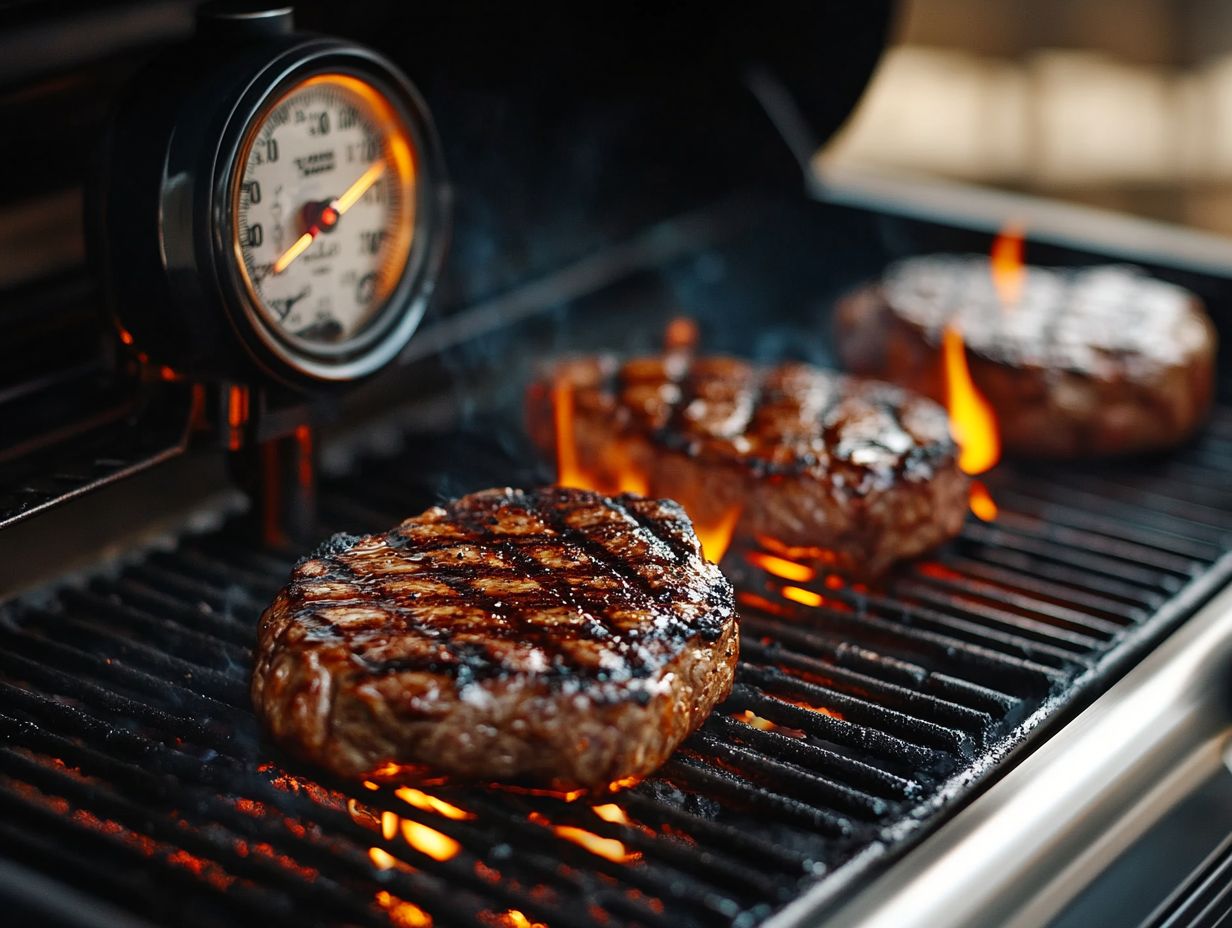
The type of grill you use can greatly affect cooking time. Different grills have unique heating elements and cooking surfaces, impacting how long it takes to cook your food.
2. Does the grill type affect the cooking time for all types of food, including various types of meat and vegetables?
Yes, the impact of grill type on cooking time applies to all food types, including meats, vegetables, and even desserts. The grill affects texture, flavor, and overall cooking time.
3. How does a gas grill compare to a charcoal grill in terms of cooking time and proper temperature?
A gas grill usually heats up faster and maintains a consistent temperature. A charcoal grill may take longer to heat and requires more attention during cooking, leading to shorter cooking times for gas grills.
4. Can the size of the grill impact cooking time and the cooking practices used?
Yes, the grill size can affect cooking time. Larger grills may take longer to heat and cook food evenly, while smaller grills heat up quickly and require less time for smaller portions.
5. Do different types of grills require different cooking methods and techniques to achieve desired results?
Yes, different grills require different cooking techniques. For instance, a gas grill may need preheating and a more hands-off approach. In contrast, a charcoal grill might require more attention and indirect heat for certain foods.
Don t miss out on juicy, perfectly cooked meat try these tips during your next grilling session!
6. Is there a significant difference in cooking time between electric and propane grills, particularly in relation to cooking guides?
Electric grills often cook food faster than propane grills. They achieve this with higher heat output and better temperature settings.
This means you can enjoy your delicious meals in no time!

